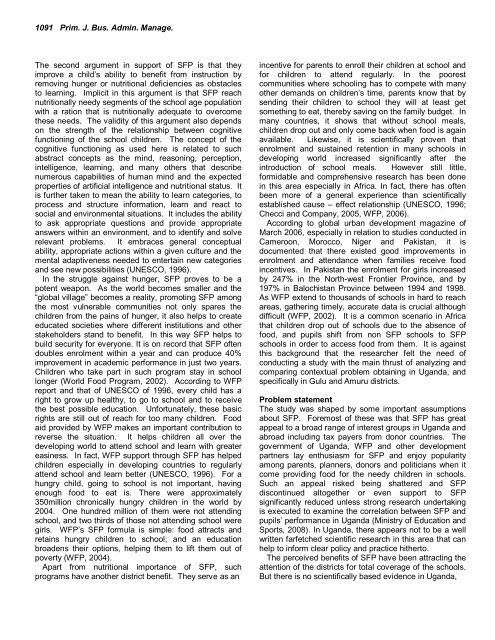You also want an ePaper? Increase the reach of your titles
YUMPU automatically turns print PDFs into web optimized ePapers that Google loves.
1091 Prim. J. Bus. Admin. Manage.The second argument in support of SFP is that theyimprove a child’s ability to benefit from instruction byremoving hunger or nutritional deficiencies as obstaclesto learning. Implicit in this argument is that SFP reachnutritionally needy segments of the school age populationwith a ration that is nutritionally adequate to overcomethese needs. The validity of this argument also dependson the strength of the relationship between cognitivefunctioning of the school children. The concept of thecognitive functioning as used here is related to suchabstract concepts as the mind, reasoning, perception,intelligence, learning, and many others that describenumerous capabilities of human mind and the expectedproperties of artificial intelligence and nutritional status. Itis further taken to mean the ability to learn categories, toprocess and structure information, learn and react tosocial and environmental situations. It includes the abilityto ask appropriate questions and provide appropriateanswers within an environment, and to identify and solverelevant problems. It embraces general conceptualability, appropriate actions within a given culture and themental adaptiveness needed to entertain new categoriesand see new possibilities (UNESCO, 1996).In the struggle against hunger, SFP proves to be apotent weapon. As the world becomes smaller and the“global village” becomes a reality, promoting SFP amongthe most vulnerable communities not only spares thechildren from the pains of hunger, it also helps to createeducated societies where different institutions and otherstakeholders stand to benefit. In this way SFP helps tobuild security for everyone. It is on record that SFP oftendoubles enrolment within a year and can produce 40%improvement in academic performance in just two years.Children who take part in such program stay in schoollonger (World Food Program, 2002). According to WFPreport and that of UNESCO of 1996, every child has aright to grow up healthy, to go to school and to receivethe best possible education. Unfortunately, these basicrights are still out of reach for too many children. Foodaid provided by WFP makes an important contribution toreverse the situation. It helps children all over thedeveloping world to attend school and learn with greatereasiness. In fact, WFP support through SFP has helpedchildren especially in developing countries to regularlyattend school and learn better (UNESCO, 1996). For ahungry child, going to school is not important, havingenough food to eat is. There were approximately350million chronically hungry children in the world by2004. One hundred million of them were not attendingschool, and two thirds of those not attending school weregirls. WFP’s SFP formula is simple: food attracts andretains hungry children to school; and an educationbroadens their options, helping them to lift them out ofpoverty (WFP, 2004).Apart from nutritional importance of SFP, suchprograms have another district benefit. They serve as anincentive for parents to enroll their children at school andfor children to attend regularly. In the poorestcommunities where schooling has to compete with manyother demands on children’s time, parents know that bysending their children to school they will at least getsomething to eat, thereby saving on the family budget. Inmany countries, it shows that without school meals,children drop out and only come back when food is againavailable. Likewise, it is scientifically proven thatenrolment and sustained retention in many schools indeveloping world increased significantly after theintroduction of school meals. However still little,formidable and comprehensive research has been donein this area especially in Africa. In fact, there has oftenbeen more of a general experience than scientificallyestablished cause – effect relationship (UNESCO, 1996;Checci and Company, 2005, WFP, 2006).According to global urban development magazine ofMarch 2006, especially in relation to studies conducted inCameroon, Morocco, Niger and Pakistan, it isdocumented that there existed good improvements inenrolment and attendance when families receive foodincentives. In Pakistan the enrolment for girls increasedby 247% in the North-west Frontier Province, and by197% in Balochistan Province between 1994 and 1998.As WFP extend to thousands of schools in hard to reachareas, gathering timely, accurate data is crucial althoughdifficult (WFP, 2002). It is a common scenario in Africathat children drop out of schools due to the absence offood, and pupils shift from non SFP schools to SFPschools in order to access food from them. It is againstthis background that the researcher felt the need ofconducting a study with the main thrust of analyzing andcomparing contextual problem obtaining in Uganda, andspecifically in Gulu and Amuru districts.Problem statementThe study was shaped by some important assumptionsabout SFP. Foremost of these was that SFP has greatappeal to a broad range of interest groups in Uganda andabroad including tax payers from donor countries. Thegovernment of Uganda, WFP and other developmentpartners lay enthusiasm for SFP and enjoy popularityamong parents, planners, donors and politicians when itcome providing food for the needy children in schools.Such an appeal risked being shattered and SFPdiscontinued altogether or even support to SFPsignificantly reduced unless strong research undertakingis executed to examine the correlation between SFP andpupils’ performance in Uganda (Ministry of Education andSports, 2008). In Uganda, there appears not to be a wellwritten farfetched scientific research in this area that canhelp to inform clear policy and practice hitherto.The perceived benefits of SFP have been attracting theattention of the districts for total coverage of the schools.But there is no scientifically based evidence in Uganda,




![See Full Article [pdf] - prime journals limited](https://img.yumpu.com/49292987/1/190x245/see-full-article-pdf-prime-journals-limited.jpg?quality=85)



![See Full Article [pdf] - Prime Journals](https://img.yumpu.com/44526114/1/190x245/see-full-article-pdf-prime-journals.jpg?quality=85)


![See Full Article [pdf] - prime journals limited](https://img.yumpu.com/42270022/1/190x245/see-full-article-pdf-prime-journals-limited.jpg?quality=85)

![See Full Article [pdf] - Prime Journals](https://img.yumpu.com/41607332/1/190x245/see-full-article-pdf-prime-journals.jpg?quality=85)
![See Full Article [pdf] - Prime Journals](https://img.yumpu.com/41231982/1/190x245/see-full-article-pdf-prime-journals.jpg?quality=85)

